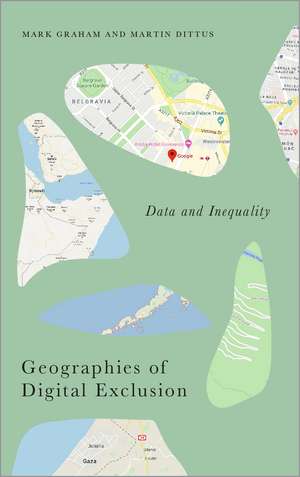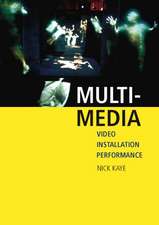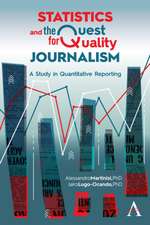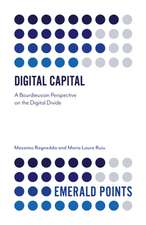Geographies of Digital Exclusion: Data and Inequality: Radical Geography
Autor Mark Graham, Martin Dittusen Limba Engleză Paperback – 19 ian 2022
Today's urban environments are layered with data and algorithms that fundamentally shape how we perceive and move through space. But are our digitally dense environments continuing to amplify inequalities rather than alleviate them? This book looks at the key contours of information inequality, and who, what and where gets left out.
Platforms like Google Maps and Wikipedia have become important gateways to understanding the world, and yet they are characterized by significant gaps and biases, often driven by processes of exclusion. As a result, their digital augmentations tend to be refractions rather than reflections: they highlight only some facets of the world at the expense of others.
This doesn't mean that more equitable futures aren't possible. By outlining the mechanisms through which our digital and material worlds intersect, the authors conclude with a roadmap for what alternative digital geographies might look like.
Platforms like Google Maps and Wikipedia have become important gateways to understanding the world, and yet they are characterized by significant gaps and biases, often driven by processes of exclusion. As a result, their digital augmentations tend to be refractions rather than reflections: they highlight only some facets of the world at the expense of others.
This doesn't mean that more equitable futures aren't possible. By outlining the mechanisms through which our digital and material worlds intersect, the authors conclude with a roadmap for what alternative digital geographies might look like.
| Toate formatele și edițiile | Preț | Express |
|---|---|---|
| Paperback (1) | 154.60 lei 3-5 săpt. | +11.86 lei 6-12 zile |
| PLUTO PRESS – 19 ian 2022 | 154.60 lei 3-5 săpt. | +11.86 lei 6-12 zile |
| Hardback (1) | 645.66 lei 6-8 săpt. | |
| PLUTO PRESS – 19 ian 2022 | 645.66 lei 6-8 săpt. |
Din seria Radical Geography
-
 Preț: 130.92 lei
Preț: 130.92 lei -
 Preț: 176.35 lei
Preț: 176.35 lei -
 Preț: 154.16 lei
Preț: 154.16 lei -
 Preț: 131.20 lei
Preț: 131.20 lei -
 Preț: 153.37 lei
Preț: 153.37 lei -
 Preț: 204.54 lei
Preț: 204.54 lei -
 Preț: 203.67 lei
Preț: 203.67 lei -
 Preț: 205.37 lei
Preț: 205.37 lei - 16%
 Preț: 581.37 lei
Preț: 581.37 lei
Preț: 154.60 lei
Nou
Puncte Express: 232
Preț estimativ în valută:
29.58€ • 31.63$ • 24.67£
29.58€ • 31.63$ • 24.67£
Carte disponibilă
Livrare economică 27 martie-10 aprilie
Livrare express 12-18 martie pentru 21.85 lei
Preluare comenzi: 021 569.72.76
Specificații
ISBN-13: 9780745340180
ISBN-10: 0745340180
Pagini: 208
Ilustrații: b&w figures and graphs
Dimensiuni: 135 x 216 x 18 mm
Greutate: 0.29 kg
Editura: PLUTO PRESS
Colecția Pluto Press
Seria Radical Geography
ISBN-10: 0745340180
Pagini: 208
Ilustrații: b&w figures and graphs
Dimensiuni: 135 x 216 x 18 mm
Greutate: 0.29 kg
Editura: PLUTO PRESS
Colecția Pluto Press
Seria Radical Geography
Notă biografică
Mark Graham is Professor of Internet Geography at the Oxford Internet Institute, University of Oxford.
Martin Dittus is a digital geographer and data scientist at the Oxford Internet Institute, with a decade of experience in social computing, mass-participation platforms and big data.
Martin Dittus is a digital geographer and data scientist at the Oxford Internet Institute, with a decade of experience in social computing, mass-participation platforms and big data.
Cuprins
List of Figures
Series Preface
Acknowledgements
1. We All Are Digital Geographers
2. When the Map Becomes the Territory
3. Making Digital Geographies
4. A Geography of Digital Geographies
5. Digital Augmentations of the City
6. Who are the Map-Makers?
7. Information Power and Inequality
8. Towards More Just Digital Geographies
Epilogue
Appendix
Reference tables
Data sources
Methodology for Chapter 5
Bibliography
Index
Series Preface
Acknowledgements
1. We All Are Digital Geographers
2. When the Map Becomes the Territory
3. Making Digital Geographies
4. A Geography of Digital Geographies
5. Digital Augmentations of the City
6. Who are the Map-Makers?
7. Information Power and Inequality
8. Towards More Just Digital Geographies
Epilogue
Appendix
Reference tables
Data sources
Methodology for Chapter 5
Bibliography
Index
Descriere
Today's urban environments are layered with data and algorithms that fundamentally shape how we perceive and move through space. But are our digitally dense environments continuing to amplify inequalities rather than alleviate them? This book looks at the key contours of information inequality, and who, what and where gets left out.
Platforms like Google Maps and Wikipedia have become important gateways to understanding the world, and yet they are characterized by significant gaps and biases, often driven by processes of exclusion. As a result, their digital augmentations tend to be refractions rather than reflections: they highlight only some facets of the world at the expense of others.
This doesn't mean that more equitable futures aren't possible. By outlining the mechanisms through which our digital and material worlds intersect, the authors conclude with a roadmap for what alternative digital geographies might look like.
Platforms like Google Maps and Wikipedia have become important gateways to understanding the world, and yet they are characterized by significant gaps and biases, often driven by processes of exclusion. As a result, their digital augmentations tend to be refractions rather than reflections: they highlight only some facets of the world at the expense of others.
This doesn't mean that more equitable futures aren't possible. By outlining the mechanisms through which our digital and material worlds intersect, the authors conclude with a roadmap for what alternative digital geographies might look like.























